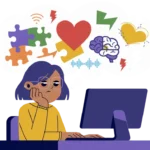When discussing myths and facts about Down syndrome, it’s essential to recognize how misconceptions create barriers for individuals with this condition. Although awareness has grown, stereotypes still persist. By addressing these myths with evidence-based facts, we can foster greater understanding, acceptance, and support for people with Down syndrome.

What Is Down Syndrome?
Before exploring the myths and facts about Down syndrome, it’s important to understand what this condition truly is. Down syndrome, scientifically known as Trisomy 21, occurs when a person is born with an extra chromosome 21. This additional genetic material impacts development, but the effects vary significantly from person to person.
Moreover, Down syndrome is a natural genetic condition that occurs in about 1 in 700 births worldwide. Therefore, it’s far more common than many people realize.
Common Myths and Facts About Down Syndrome
Myth: Down Syndrome Is Rare
Fact: Contrary to this belief, Down syndrome is the most common chromosomal condition worldwide. Approximately 6 million people live with Down syndrome globally, according to the Global Down Syndrome Foundation. Therefore, raising awareness is crucial to promoting inclusivity and debunking outdated stereotypes.
Myth: Individuals With Down Syndrome Cannot Be Independent
Fact: Many individuals with Down syndrome live independent or semi-independent lives. For example, some pursue higher education, maintain careers, or live on their own with minimal assistance. In addition, vocational programs and community support systems enable them to thrive.
However, independence varies based on the individual, just as it does in the general population.
Myth: Only Older Mothers Have Babies With Down Syndrome
Fact: While maternal age does increase the likelihood of having a child with Down syndrome, younger mothers account for most births of children with the condition. This is simply because younger women tend to have more children overall. Therefore, this misconception unfairly stigmatizes older mothers.
Myth: People With Down Syndrome Cannot Learn
Fact: Individuals with Down syndrome are fully capable of learning, although they may require tailored teaching methods. For instance, with the right support, many people with Down syndrome excel academically and acquire valuable life skills. Early intervention and inclusive education play a significant role in their success.
Myth: People With Down Syndrome Are Always Happy
Fact: This myth oversimplifies the emotional depth of individuals with Down syndrome. While they may be known for their friendly demeanor, they experience the full spectrum of emotions, including sadness, frustration, and anger. Consequently, it’s important to acknowledge their humanity beyond stereotypes.
Myth: Down Syndrome Is Contagious
Fact: Down syndrome is a genetic condition and cannot be “caught” like an illness. It is caused by the presence of an extra chromosome, which occurs during conception. Therefore, this myth is entirely baseless and reinforces unnecessary fear.
Myth: All People With Down Syndrome Have the Same Abilities
Fact: Every person with Down syndrome is unique, both in their abilities and their challenges. For instance, while some individuals excel in academics or creative pursuits, others may shine in athletics or social interactions. This diversity highlights the importance of personalized support and opportunities.
The Importance of Debunking Myths and Facts About Down Syndrome
Misconceptions about Down syndrome lead to misunderstandings, discrimination, and missed opportunities for individuals with the condition. However, when we educate ourselves about the facts about Down syndrome, we create a more inclusive society.
In addition, sharing accurate information helps empower families, educators, and employers to provide the right support for individuals with Down syndrome.
How to Promote Awareness of Myths and Facts About Down Syndrome
Addressing the myths and facts about Down syndrome is a collective effort. Here are some practical ways to make a difference:
- Educate Others: Share resources from credible organizations and advocate for inclusive education and workplaces.
- Support Representation: Encourage positive portrayals of individuals with Down syndrome in media and public platforms.
- Volunteer or Donate: Contribute to organizations that support individuals with Down syndrome and their families.
- Use Respectful Language: Avoid using outdated or derogatory terms, and instead focus on person-first language, such as “a person with Down syndrome.”
By taking these steps, you can help challenge stereotypes and promote a more accepting world.
FAQs About Myths and Facts About Down Syndrome
What causes Down syndrome?
Down syndrome is caused by an extra chromosome 21. This random genetic occurrence happens during the formation of reproductive cells.
Can people with Down syndrome have careers?
Yes, many individuals with Down syndrome are employed in diverse fields, including hospitality, retail, and even professional offices. With proper training, they excel in their roles.
Are all individuals with Down syndrome alike?
No, every person with Down syndrome is unique, with their own abilities, challenges, and interests. Just like anyone else, they have individual personalities and talents.
Can people with Down syndrome form relationships?
Absolutely. People with Down syndrome enjoy meaningful relationships with friends, family, and romantic partners. They value companionship and emotional connection like everyone else.
Do people with Down syndrome live shorter lives?
Medical advancements have significantly improved life expectancy for individuals with Down syndrome. Today, many live well into their 60s and beyond.
Is Down syndrome hereditary?
In most cases, Down syndrome is not hereditary. It typically occurs randomly during conception and is not passed down from parents.
Conclusion: Embracing the Truth About Down Syndrome
Understanding the myths and facts about Down syndrome is a critical step toward fostering inclusivity and breaking down harmful stereotypes. Individuals with Down syndrome contribute richly to our communities, offering unique perspectives, talents, and compassion.
Therefore, let’s commit to spreading accurate information, celebrating diversity, and creating opportunities that allow everyone to thrive. When myths are replaced with facts, the world becomes a more inclusive and supportive place for all.
Inbound Links
- Understanding Autism ADHD Meltdowns: Signs and Support Strategies
- Dyslexia in Education: Understanding, Innovating, and Empowering



Leave a Comment